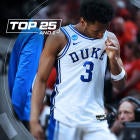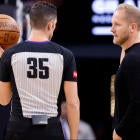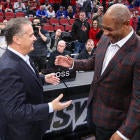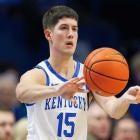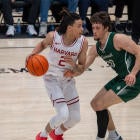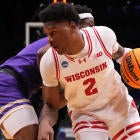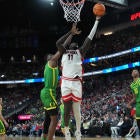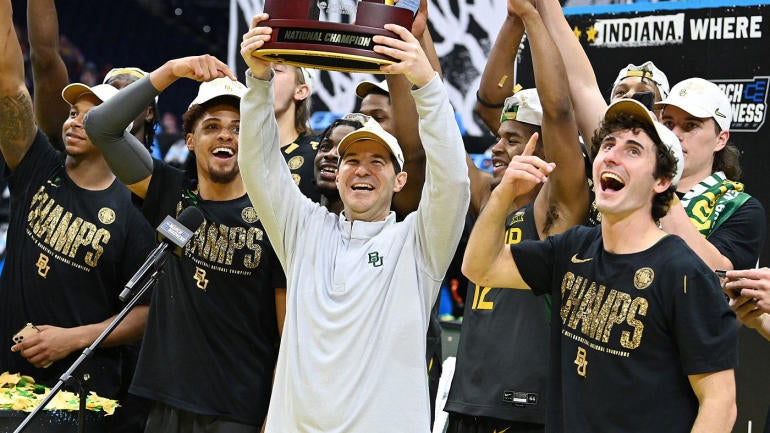
When Clemson coach Dabo Swinney spoke to the media after the Tigers topped Alabama in January 2019 to win his second national championship, he couldn't have known that his answer might trigger another team to hoist a championship trophy. But when Swinney talked about JOY, he drew an interested audience in the Baylor basketball offices in Waco, Texas.
"For me, joy comes from focusing on Jesus, others and yourself," Swinney said. There are so many coaches that are so deserving of a moment like this. To get to do it once, and now to get to do it again, it's a blessing. It's simply the grace of the good Lord to allow us to experience something like this. When you get a young group of people who believe, who sacrifice, who are committed to a singleness of purpose, great things can happen. You can't write a Hollywood script like this. Only God can do this."
Swinney might have been talking through the media to Clemson fans. But he might as well have been speaking directly to Baylor coach Scott Drew. Since taking over in the ashes of the Dave Bliss era, Drew said he was focused on what he called, "a Christ-centered program." Baylor assistant Jerome Tang noted that the Bears attempted to emulate "I am third," a message often repeated by former Drew player Greg Tonagel, who coaches at Indiana Wesleyan.
But something in Swinney's speech stuck with Drew.
"It just resonated with coach like, man, that simple word sums up what we've been about," Tang said. "And he came in, and he says, 'You know, I want to build on on that.' It's just a simple way to describe what we're about, and Baylor being the largest Baptist school in the country, we're allowed to share our faith."
Just like that, the culture of JOY was born.
"Everybody has a catch phrase, a mantra," Drew said. "This said what we wanted to be."
What Baylor wanted to be made the Bears more equipped to deal with the challenges presented by COVID-19, and ultimately led to the program's first men's basketball championship in 2021
—————
The faith aspect of Culture of JOY is immutable. But Tang also said at its heart, JOY is about servant-leadership and putting others first. For a basketball team, that means sacrificing for the good of the whole.
"When we talk about ourselves, we say, take what is the thing you do best and be willing to share it with the team and for the team. So it's not about, 'Well, now it's the third thing. So now I get to think about me,'" Tang said. "But it's, 'No, how do I take what I do best, interject it into the team and the chemistry.'"
Baylor created things like "shared sugar," with players getting candy for having the most assists or the highest assist-to-turnover ratio after games. And while the Bears used film study to pick apart opponents' tendencies, they also used it to highlight interviews where Baylor players shared the credit with their teammates.
That quickly built team chemistry, as did a 2019 trip to Italy, according to former Baylor forward Mark Vital. The Bears had begun sacrificing the year before, when injuries to Tristan Clark and Makai Mason forced players into uncertain roles, but Vital said that didn't really count because those were forced sacrifices. Instead, Baylor needed to learn to give freely for the good of the team.
"We went on a trip to Italy and it changed everything," said Vital, now a tight end with the Kansas City Chiefs. "That trip right there changed a lot of stuff as far as bonding because everybody had to bond with somebody because we didn't want to be out there. So you try to figure it out. My advice to any coach from now on, take a team overseas and watch them bond. Because they're not comfortable with their situation, the living situation, the food, everything. You've got to figure it out. It's a whole different culture over there. So that's my best advice to those guys. If you want to win a national championship, go ahead and take your team overseas."
Baylor won all four games overseas, setting the stage for Drew's best season to that point, a 26-4 run and a likely No. 1 seed in the NCAA Tournament before it was canceled for COVID-19.
"I think (the national championship culture) started the year before, when you had Freddie Gillespie and Mark Vital (and they) were Mr. 95s," Tang said. "We call 95s, what do you do the 95% of the time you don't have the ball in your hands, to help the team win, setting screens and diving for loose balls and blocking out and running the court hard every time so the defense has to (react) to you."
Tang pointed to guard Devonte Bandoo, who came off the bench and could have started for a number of teams, essentially laying the pavement for Adam Flagler to be the same player a year later, as Flagler sat out after transferring in.
"That's the best chemistry — I'm not gonna lie to you — that's the best chemistry we've ever had," Vital said of that group. "Because if you really think about it, man, I've been to the NIT, lost in the second round (of the NCAA Tournament). My freshman year, I was redshirted, and we lost in the Sweet 16. And none of those teams bonded the way we bonded. I mean we had guys that were cool, but at the same time, it wasn't that same thing we had in 2020 and 2021."
Ultimately the year, and Baylor's championship hopes, came to a crashing halt.
"We had a group of guys that even then were willing to share and sacrifice and their season got cut short," Tang said. "And we didn't get to play in the tournament. And so when MaCio (Teague) and Jared (Butler) tested the waters and decided to come back, we came back with a purpose of wanting to win the whole thing.
"And so we could talk a lot about, hey, if you really want to win the whole thing, this is what has to happen," Tang said. "You sacrificed to come back for this. And so when your guy coming off the bench, sees that your starters, your guys who could have left, came back and they are sacrificing, it's easy for them to be willing to sacrifice also."
—————
After the NBA Draft was delayed until November 2020 because of COVID-19, Kentucky coach John Calipari warned that teams would need to take a longer look at the mental health aspect.
"Can you imagine the anxiety? Can you imagine the thoughts going through a young person's mind? Well, it brings me back to my own team," Calipari said at the time, on The Paul Finebaum Show. "All of us better have psychologists, sports psychologists. We better not overlook what our kids are going through mentally."
Baylor brought an experienced team back. Four starters returned from the previous year, and all had sacrificed in some way to get there: soon-to-be All-America guards Butler and Davion Mitchell, Teague and Vital, with Flo Thamba and Jonathan Tchamwa-Tchatchoua joining Vital as new Mr. 95s. But the mental health obstacle the team faced as college basketball teams essentially quarantined off the court was something new.
From Tang's perspective, Baylor was uniquely equipped to deal with that challenge.
"Well, I think Scott Drew was the person best equipped to lead in that situation. Coach did not allow the bubble to be a prison," Tang said. "It wasn't a lockdown for us."
Drew, as is typical, deferred Tang's praise, noting that the Bears simply followed the lead of professional sports franchises in dealing with mental health. But the Bears also didn't sit on their hands. The coaching staff kept an open line of communication with Monique Marsh-Bell, the school's associate athletic director for mental health services, asking her for activities and ways to keep the burden of quarantine off the players.
After all, not every player dealt with things the same way. Vital said some of the Baylor players were homebodies who enjoyed the chance to sit alone with video games or their studies. That wasn't the case for Vital.
"I can speak for myself where I have to let loose sometimes because I have that same Dennis Rodman persona as far as like, 'Coach, you know how I am, you know how my background is, you know that I can't just stay and I go crazy if I have to stare at walls all day,'" Vital said. "It was really getting to me at one point, I couldn't even leave the house. As far as just walking my dog outside was probably the best I could do … It was really mentally draining for me."
So the Bears leaned on Marsh-Bell. Cornhole became a full-team activity. Heated UNO games became the norm. And the Baylor social media team captured the team's Connect 4 tournament, even as the Bears were at the team hotel for the NCAA Tournament.
The Baylor Bubble #MarchMadness Connect 4 Championship Match
— Baylor Men’s Basketball (@BaylorMBB) March 24, 2021
LJ Cryer
vs.
Davion Mitchell #SicEm 🐻 | #TimeIsNow 🏀 https://t.co/E8woDelbw4
"Just the group of guys were great guys," Tang said. "They really liked being around each other. Some teams get tired of each other. I'd never played cornhole … I don't think most of our guys had, and I'm telling you MaCio Teague became a cornhole champion. There were some knockdown drag-out competitions with cornhole and Connect 4 and UNO.
"We did a bunch of things that really helped our guys to feel comfortable and not feel like they were in lockdown," Tang said.
That also included a team karaoke day.
"We really liked karaoke," Drew said of the coaches. "I'm not sure the players liked it as much."
"That's the fact that we were singing and they weren't," Vital said, laughing. "They were enjoying us, man. I feel like they were just so happy to see us smiling, laughing, giggling, just (to) make sure you know, we were all mentally good."
—————
On the court, the Bears were taking care of the business aspect. They won their first two NCAA Tournament games, over Hartford and Wisconsin, by double digits. And while some coaches talk about the trip home between tournament weekends as energizing — the players head back to a happy campus full of back-slapping and well-wishers — the ever-optimistic Drew said he thought there was an advantage to remaining in the NCAA Tournament bubble.
"I think in a lot of ways it was a positive because we were always able to touch them, know how they were doing and how they were feeling," Drew said.
On the court, the Bears were rounding back into form after shaking off the rust from a three-week COVID absence in February. Tang said there were three times during the season he thought the Bears were unbeatable, and the second of those times came in the second half of an 83-69 win at Texas on Feb. 2. Then COVID hit the program, with the Bears not returning to the court until Feb. 23.
The third of those 'unbeatable' times? When the team practiced before the Villanova game.
"Two days before we played Villanova, that was the next time I said, 'Woo, I don't know if anybody can beat us,'" Tang said. "We had gotten back to that point where on the court, the communication, how they were playing, just their interaction with each other … it was special."
Baylor shot poorly in the Villanova game, making just 3-of-19 from deep, but the Bears' defense snapped back into place and Baylor won 62-51. Baylor then reached the Final Four with a nine-point win over Arkansas.
And as the stakes got higher, Vital said the Bears stayed loose while their opponents tightened up.
"We felt that a lot because we were a veteran team, and it was just our confidence and our swagger," Vital said. "Like, we felt that we knew we were champions like before we even (did it). When we won the Big 12, we already knew we were gonna win the Big 12 and we got a championship? We were like, 'Oh, yeah, we're winning a national title.' We didn't see anybody beating us.
"Then again, we were better than a lot of teams," Vital said. "I can give you the straight answer on that one too: We just knew we were better than a lot of teams because of that JOY factor, man. Like we knew who we were, we knew our identity and I just felt that we knew that nobody could do that with us if we just be who we are."
Two more double-digit wins later, over Houston in the Final Four and a previously unbeaten Gonzaga in the national title game, and the Bears were cutting down the nets.
—————
That's where the Bears want to be at the end of this year's NCAA Tournament too. And Baylor enters the NCAA Tournament as a No. 1 seed for the second consecutive time, thanks in part to a player who plugged right in to the Baylor culture.
The Bears lost four starters, including a star-studded backcourt, but promoted from within, with Adam Flagler and Matthew Mayer joining the starting lineup after starring as reserves a year ago. The point guard spot still needed solving, and the Baylor staff found a plug-and-play option in Arizona transfer James Akinjo. In a season where a number of transfers have failed to live up to lofty expectations, Akinjo earned first-team All-Big 12 honors and was a big part of the reason the team repeated as Big 12 champions.
"It's a work ethic thing. He fits our culture," Tang said, when asked about how Akinjo fit in immediately. "We have a lot of guys that spend a lot of time in the gym. And I mean, Waco, Texas, you've got Baylor University, you got a few really nice restaurants, a couple movie theaters, but there's not a lot of distractions. And if you come here, it's because you're really serious about your basketball. And so there are other places if you're worried about nightlife and all the other stuff there are other places you can go, but if you're real serious about your basketball and wanting to get better, this is this is a great place for you.
"He fit that culture. And so when our guys who already here see him in the gym as much as they see him in the gym, they're like, 'Oh, he's one of us,'" Tang said. "And when guys spend time in the gym together, they build relationship and chemistry. And they learn each other. And I don't think James had been at a place where there were this many guys in the gym as much as he was. And he was like, 'Man, you guys are serious about this down here.'"
Tang called Akinjo a winner and a "blessing," noting that this year's team is a continuation of the Culture of JOY the team has worked to build. Drew attributed some of that to the program's alumni, who can help a player find his role.
"Whether it's a transfer or a fourth year player or a one-and-done, we can usually find someone who shares their experiences that they can relate with. Players typically listen to other players more than they listen to coaches, unfortunately," Drew said, laughing.
Among those alumni is Vital, who said he's kept a close eye on this year's team.
"All right, I see it, I see it in 'em," Vital said of the Culture of JOY. "I'm not just saying that because that's my team, I actually see it in 'em. I feel like there's some things they can do differently than we did. But I feel like as far as loving each other, I see it. They're playing together; they pass the ball. You can tell how a team loves each other by the way they pass the ball to each other.
"When a guy passes the ball to you and they trust you and tell you to shoot and they give it back to you to shoot again, they've got trust and love for you," Vital said. "So I see it in them. I feel like they're going to go to the Final Four, if not, an Elite Eight for sure. I want' em to win it all. But that's just me being honest."
Asked for advice he would give this year's Baylor team, Vital went back to JOY.
"Just be yourselves," Vital said. "For all my athletes, you know, just play a role. Buy into what your coach is doing. And winning gets you to the NBA. Winning gets you to the NFL. Winning does all that for you. But it all starts with putting Jesus first, then others, then yourself."














